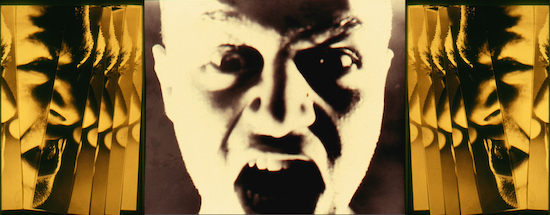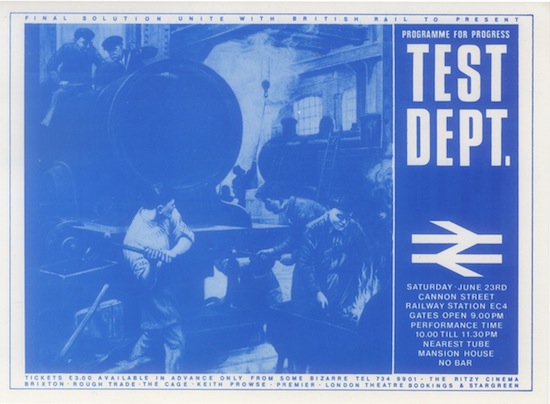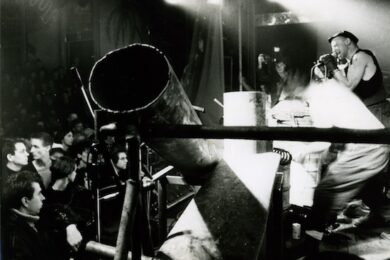Feared and monitored by the British establishment, tailed across East Germany by the Stasi, sponsored by the condemned Greater London Council and regularly hosted by British Rail, the history of Test Dept in the 1980s alone is remarkable and their often prophetic role in the struggles of that era still overlooked. They were on the front line of struggles against pit closures and Murdoch (not to mention their stand against apartheid) but their political commitment didn’t compromise their artistic ambition and vision.
Much of what they tried to warn against three decades ago has now come to pass in even more nightmarish forms and after re-activating in 2014, Test Dept have found their moment. Through the group’s re-emergence at another time of acute political and economic crisis, people are learning that 1980s revivalism can be about far more than the necrostalgic repetition of style. The hard lessons and hard battles the group were involved in back then are disturbingly relevant now and their ambitious Assembly of Disturbance event aims to illustrate the urgency of their message and demonstrate their cultural and political influence.
Use Your Surroundings
"The physical location of Test Dept at their inception was very close to the artery of the city, The River Thames, from which the lifeblood of the British Empire was born. There was always a certain irony and lost humour in the fact that the waste and detritus of this old world could be found in the proliferation of scrapyards amidst the decaying docks on our doorstep. The great Maritime centre of Greenwich where many British admirals had planned their wars and voyages, was adjacent to Deptford where we scavenged and foraged for scrap metal which was forged into a sonic battery of epic proportions. The local rag and bone men (look it up), used to come past our squatted house in Nettleton Road (New Cross) and drop off old water tanks, car springs, sheet metal, gas cylinders anything that had a sonic resonance and could be hit with force with metal drumsticks or sledge hammers. This utilitarian approach based on artistic integrity and economic necessity were to form the modus operandi of Test Dept."
Manifestos
"Our visual director Brett Turnbull had been deeply influenced by Vertov and Eisenstein and the early revolutionary cinema in Russia after 1917. He saw us as a great vehicle for pushing a revolutionary agenda, an irony of the young unemployed portrayed as heroic ‘Stakhanovite’ workers. We developed this visual aesthetic and enhanced it through the use of manifestos to put forward a radical message of anger and dissent, influenced by revolutionary poets Mayakovsky and Rodchenko. ‘Extreme Conditions, Demand Extreme Responses’."
Program For Progress

Tryptich by Brett Turnbull
"The decision to make our debut release a video album (VHS) produced by Brett Turnbull was a clear statement that we regarded the visuals as an equal partner in our arsenal and integral to our operation. A large bulk of the video was shot in freezing conditions at the Beckton Coke and Gas Works, once the largest in Europe (long since demolished), where Brett extended his visual vocabulary with industrial cinematic visions with a nod to contemporary Russian film-maker Andrei Tarkovsky."
Station To Station

"Oddly enough, our insistence on searching for unique and unconventional sites to perform in, while eschewing mainstream music venues wherever possible, led us indirectly to a long-term association with British Rail. Our first unique location was at Arch 69 a disused railway arch near Waterloo station where we performed with angle grinders amidst leaking fuel tanks, a Health and Safety nightmare with a 3pm Saturday afternoon kick off. Titan Arch (Waterloo) followed shortly after – a secret location tracked, raided and shut down by the police.
"Cannon St mainline train station in the centre of the financial centre of London was next, with use of the space negotiated by avant promoters ‘Final Solution’ responsible for bringing TG, Cabaret Voltaire and Joy Division to a wider audience.
"With the help of the condemned ‘Greater London Council’, abolished by Maggie Thatcher, we were able to present ‘The Unacceptable Face Of Freedom’ at Bishopsbridge Rail Depot outside Paddington Station. This was our first opportunity to launch a large-scale collaboration under the newly formed ‘Ministry Of Power’ a platform for the group’s large-scale theatrical and site-specific performances. This event was closely monitored and visited by the Special Patrol Group; another aspect of our emerging relationship with the Metropolitan Police.
"Finally, ‘The Second Coming’ part of the Glasgow Year of Culture in 1990 saw us perform in the St Rollox Railworks, Springburn; a huge maintenance and train producing factory. With over 100 performers we made full use of the vast industrial site, utilising the machinery and even a giant snow plough, which was dragged along rails right up to the audience."
The Ministry Of Power
"MOP was launched with the event ‘The Unacceptable Face Of Freedom’ for which we assembled a new collective force of multi-disciplinary artists and activists. The action took place on a central stage surrounded by the audience and featured huge sculptural metal instruments created by designer Tom Dixon, with sculpture from Malcom Poynter which had adorned the UFOF album cover, and Alan Sutcliffe, a striking Kent Miner, reciting his tales of police brutality on the picket lines. Choreographed movement came from dance troupe ‘Company Of Cracks’, and the trapeze artists ‘Ra Ra Zoo’. It was a physiological experience with total immersion in 360 degree sound, film, flame, light and action. It is still widely regarded as the prototype site-specific event and industrial rave.
"Word went out and an invitation to perform on Britain Day at Expo World Trade Fair gave the opportunity to expand the collective to a scratch Orchestra, The Chinese State Ribbon Troupe, lumberjacks juggling chainsaws, and the illicitly borrowed Queens Own Royal Lancashire Band, there to escort the Royals and Margaret Thatcher. Alan Sutcliffe rounded everything off causing great consternation by reading ‘I Fought A Monster Today’ from Irish republican hunger striker Bobby Sands, draped in a blanket. It was a fitting climax to an alternative view of Britain that didn’t cater for the corporations and arms dealers present. The powers that be were not amused."
Collaboration

Photograph by Brett Turnbull
"The MOP opened up the possibility of further collaborations and large-scale spectacles. This led to ‘Demonomania’ in the Monasterio de San Benito in Valladollid, former centre of the Spanish Inquistion. The performance employed local artists including musicians and actors from local academies in a ritualistic exorcism of the space, conjuring up Boschian images of hell and the nightmares of the Spanish Civil War and Spain under the fascist dictatorship of General Franco. The final night’s cancellation in an epic downpour led to audience and artists joining forces to cleanse the space, and the town, in a mass drum and dance ritual.
"The 1985 event ‘Convention of Hysteria’ at the Albany in Deptford led to TD’s collaboration with the inimitable dark diva Diamanda Galas in a performance of Abel and Cain. Technical problems only fuelled the intensity of a performance described by some as the most unrelenting and unforgiving show they had ever seen."
Gododdin
"Gododdin a collaboration with Welsh speaking Theatre company Brith Gof (Faint Recollection), masterminded by leading figure in performance and site specific work Mike Pearson and with truly epic ‘stage design’ by Cliff McLucas (RIP). Gododdin was based on an ancient Welsh poem about a band of heroic Celtic warriors who ride to meet their destiny against a vastly superior Anglo-Saxon force. The stages were in an array of unusual venues, from car factories to ice hockey stadiums and sand quarries. The set in the disused Rover Car Factory outside Cardiff was lit by the headlights of old cars and featured avenues of fir trees and a mountain of sand. The climax of the show saw the entire space flooded with the audience clambering onto piles of sand banks, bringing the realisation that they were indeed the anticipated enemy as the Brith Gof and TD crew sonically and physically invaded the audience’s space. The tour finale in Glasgow’s Tramway was the most demanding physical performance that TD ever performed; being driven back by water cannon while attempting to scale a high metal ramp, it really brought home to the audience a glimpse of the grim reality and utter futility of war, exacerbated by the body bags hung on hooks as they left the venue.
East West European Networks
"Starting with the infamous Berlin Atonal Festival of 1985, Test Dept embarked on the building of a deep and lasting network of like minds across both East and West Europe in the years before the fall of the Berlin Wall. At Atonal we met Laibach and soon after travelled with them to Ljubljana, Slovenia, and also performed in Zagreb, both still part of communist Yugoslavia. Later that year a tour of East and West Europe was arranged, leading to encounters with officials and border guards from the DDR through Poland and Czechoslovakia to Hungary, with the STASI tracking our progress across their domain. A show at the Warsaw National Stadium was followed by two coach crashes on the way to a harvest festival gathering for the Polish Peasants Trade Union near the Russian border. At our forced stop in Lublin we managed to negotiate the extensive rebuild of our vehicle at the regional Bus Factory after performing a benefit for the Mexico City earthquake for the factory workers. In Budapest we found a huge crowd in the grand hall of Petofi Czarnok, linking up again with Art Deco with whom we had shared a stage at Atonal. Coming out into the West we eventually teamed up with Hay Schoolmeesters of the NL Centrum in Amsterdam, a meeting of like-minds enabling future events in unusual venues and locations such as an underpass at Waterlooplein, and abandoned spaces in the Amsterdam docklands."
Centri Sociali Italia
"The Centri Sociali in Italy also provided politically focused DIY alternative found-space settings, similar to the environment of our inception in the squats of London and Amsterdam. Co-ordinating with anarchist collective Contrepotera and activists and organisers from the social centres across the country. Later touring with the Mutoid Waste Company convoy, then exiled from the UK after the 1994 Criminal Justice Act. We played many alternative spaces in Italy, including squatted factories in Bologna; Napoli and Milan; the 19th century army fort of Forte Prenestino in Rome; a squatted warehouse on the banks of the River Po in Turin and an all-night rave on the side of Mount Etna in Sicily, with the volcano erupting and the lava flowing as a backdrop behind us."
Protest
"The focus of our political stance was changed by the 84/85 miners strike. We went from making work exposing the lies and propagandised techniques by institutions of power, to a fully focussed war against the Thatcherite neoliberal doctrine being introduced on the back of the destruction of the miners’ union, the NUM. Starting with a benefit at the Albany Empire in Deptford with the South Wales Striking Miners’ Choir, and then embarking on a tour to support the miners. From joining picket lines in the early morning Yorkshire fog, to playing in the welfare clubs of pit villages across the country we ended up in Aylesham, attached to Snowdown Colliery and the home of Kent miner Alan Sutcliffe, where a lifelong friendship was forged. Alan went on to contribute words of outrage and fiery performances to the Test Dept and MoP shows in Paddington and Expo ‘86. In ‘87 we were on the protest marches and the picket lines in the streets surrounding the Wapping Printworks where Murdoch had encamped after ditching his workforce and the printing machines of Fleet Street. Fierce battles with police raged in those streets and many injuries, both physical and psychological, were sustained. We organised a benefit for the sacked print workers at the Hackney Empire and a large Ministry of Power production was staged.
Some years later, the day after playing two anti-Poll Tax benefits, we were marching towards Trafalgar Square before travelling to Glasgow for another benefit when the whole thing kicked off and the infamous Poll Tax Riots signaled the end of the Thatcher era. Alan was with us again on the boat for our staging of DS30, a site-specific, AV Festival produced film installation at Dunston Staiths on the River Tyne in Newcastle, made for the 30th anniversary of the miners’ strike.
Test Dept’s Assembly Of Disturbance takes place this weekend at Red Gallery, London. The book Test Dept Total State Machine, edited by Alexei Monroe and Peter Webb is available from PC Press.



